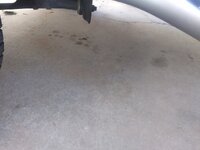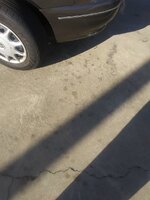I think this discussion includes some very important info for anyone who owns a 90s era car that originally specced dino oil. My cars are 2005+ and received syn/blend since day 1 so this is not necessarily relevant to my current fleet, but it is interesting nevertheless.
From what I have seen from most sources on the interwebs, the general consensus is that older gaskets become worn after years of dino oil which does not lubricate as well as syn oil, and also allows some sludge buildup if not changed frequently enough; switching to syn then removes any sludge that previously kept the seals functional, or otherwise seeps into cracks/gaps that dino oil did not, resulting in a leak. In other words, syn oil reveals a leak that was masked by dino. As mentioned above, we do not have empirical evidence to directly test this claim, but it could be addressed if the following question is answered:
Have any of the four cars in question exhibited repeat leaks from the same location as the previous leak (RMS, valve cover, etc)?
If only old seals leak, then it is likely that the general consensus (above) is correct. However, if the new seals also leak, then several possibilities exist:
1. The component (crankshaft, valve cover, etc) is damaged or has a groove worn into it, preventing a new seal from mating with the surface.
2. The new gasket/seal is of poor quality (fake part from ebay/amazon).
3. The new part was installed incorrectly (wrong sealant, bolts not torqued to spec, wrong tool damaged the seal, etc).
4. Syn or HM oil damages gaskets/seals and causes leaks.
I can't say which of these possibilities is correct, but I have my biases/presuppositions...
yes 2 leaks have resurfaced and were warrantied and do not currently leak.
that bit you said about conventional not properly caring for seals in the first place and likely turning acidic seems VERY plausable to me. Thank you for that perspective.
no rms leaks after repair.
all gaskets were felpro from rockauto, parts geeek, dealer or auto part store....no exceptions. All seals were OEM from dealer no exceptions. my mechanics allow me to bring my own parts because i only buy the best i can get and don't let price factor into my parts.
on ford, oil pan leak that poped up a second time, we put a new oil pan on just to make sure mating surface was perfect....no leaks since then. on buick timing cover......mechanic showed me the seal and it looked fine but new seal didnt leak.
I think you hit the nail on the head for my problem. even though they were old cars.....i always bought either Ford raceing or ac delco professional/gold filters and wally world motocraft and local dealer sourced ac delco oil (for gms) prior to researching oil and trying synthetics after begining to research oils and finding this place.
96 f250 5.8 I've had since 17 k miles. no idea on service history prior to my acquisition.....but only had 17 k. now has 65k
03 buick century got with 70 k was bought new off the lot by my granny in 04 as it was left over stock and was serviced at dealership every 6 months or when olm light kicked on until i got it about 2.5 years ago. now has 99 k.
03 deville got with 73 k owned by an older lady who basically did the same as above car and i obtained a print out of its whole service history when i took it to the local dealer it originally came from (few blocks from my house) to replace the ignition cylinder. same as above buick.... oci when olm kicked on. this car had an occasional drip from the oil pressure sensor but stopped when was replaced upon purchase. Now has 111 k and is a leaker.
98 jimmy bought with 107 k from mother whos husband passed away.....he bought from an old lady who kept detailed service records on it. did get some dealer service but mostly serviced at a garage that gave it quaker state most of its life.....have a thick paper file from moms husnand and original owner. now has 113k.
it was very strange....i basically bought 4 cars in 5 years and ran them with conventional and oem high grade filters for a few years.....with 0 leaks...85% highway driving. Then in 2021 I leaned about synthetics and High Mileage oils and made the switch thinking I was doing a good thing.....trying a different brands (m1 hm ep x2, castrol edge hm, and pennzoil platinum hm) and going with puro boss, mobil 1, wix xp, and k&n filters in 6 month intervals never hitting 5500 miles on any of them. and since about 4 months into switching up to now....the leaks haven't stopped.




